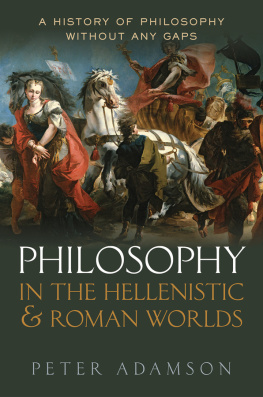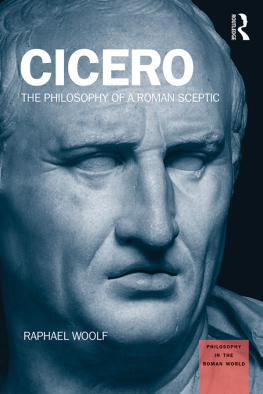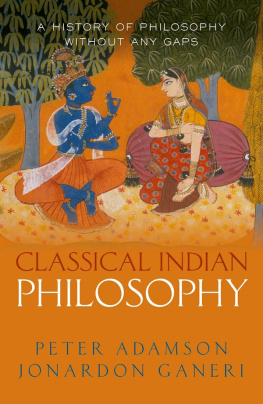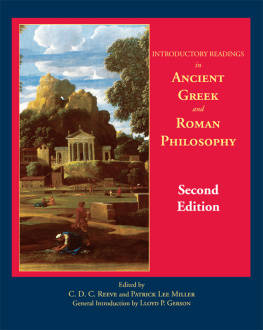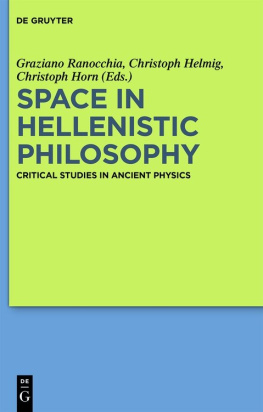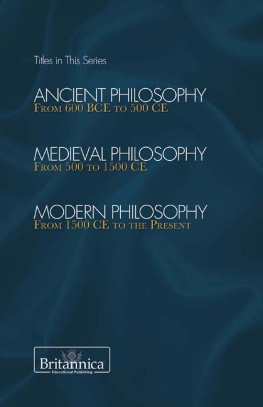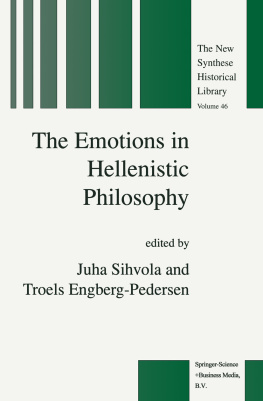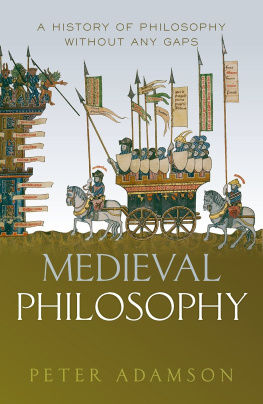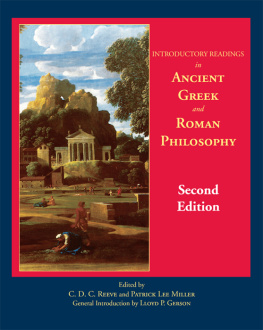Philosophy in the Hellenistic and Roman Worlds

Great Clarendon Street, Oxford, ox 2 6 dp , United Kingdom
Oxford University Press is a department of the University of Oxford. It furthers the Universitys objective of excellence in research, scholarship, and education by publishing worldwide. Oxford is a registered trade mark of Oxford University Press in the UK and in certain other countries
Peter Adamson 2015
The moral rights of the author have been asserted
First Edition published in 2015
Impression: 1
All rights reserved. No part of this publication may be reproduced, stored in a retrieval system, or transmitted, in any form or by any means, without the prior permission in writing of Oxford University Press, or as expressly permitted by law, by licence or under terms agreed with the appropriate reprographics rights organization. Enquiries concerning reproduction outside the scope of the above should be sent to the Rights Department, Oxford University Press, at the address above
You must not circulate this work in any other form and you must impose this same condition on any acquirer
Published in the United States of America by Oxford University Press 198 Madison Avenue, New York, NY 10016, United States of America
British Library Cataloguing in Publication Data
Data available
Library of Congress Control Number: 2013956024
ISBN 9780198728023
ebook ISBN 9780191043901
Printed in Great Britain by Clays Ltd, St Ives plc
Links to third party websites are provided by Oxford in good faith and for information only. Oxford disclaims any responsibility for the materials contained in any third party website referenced in this work.
For my brother Glenn Adamson
Contents
Like a particularly devoted tribute band, this series of books aims to cover not just philosophys greatest hits, but the complete back catalogue. The project is born out of a conviction that we will understand the history of philosophy only by telling it as a continuous narrative, rather than jumping from one highlight to the next. It also allows me to discuss the many fascinating ideas and arguments that are found in less celebrated authors. I began applying this without any gaps manifesto in the first volume of this series, entitled Classical Philosophy. You dont need to have read it before turning to this book, but it wouldnt hurt. (I refer back to it occasionally in the notes.) Classical Philosophy devoted chapters to somewhat out-of-the-way topics like the Hippocratic corpus and the students of Plato and Aristotle. Nonetheless, much of that volume was spent discussing two giants, Plato and Aristotle, who are fixtures of undergraduate reading lists around the world. This book, by contrast, spends most of its time filling gaps.
It is divided into three sections, each more in danger of being unfamiliar than the last: Hellenistic philosophy, late antique philosophy among pagans, and ancient Christian philosophy. It is only relatively recently that the Hellenistic schoolsthe Cynics, Cyrenaics, Stoics, Skeptics, and Epicureansbecame the object of serious interest among professional historians of philosophy. By now they are pretty well covered in secondary literature. Even so, one could easily get through a philosophy degree at most universities without being required to learn anything about the Hellenistic period. Still less frequently do philosophy departments offer courses on Neoplatonism, the dominant tradition of later pagan philosophy. As for the third section of this book, even specialists in ancient philosophy may be slightly surprised to see how much space Ive devoted to the Christian thinkers. But its my hope, and even my expectation, that ancient Christian thought will increasingly be included in our conception of ancient philosophy over the coming decades, just as Hellenistic philosophy and Neoplatonism have been incorporated into the field. One thing about historians is they are always looking for new texts to think about, and the texts of the Christians represent the last unexplored frontier in antique philosophy.
Dont get the wrong idea, though. The figures covered in this volume may be less famous than Plato and Aristotle, but some of them arent much less famous. There are at least two giants in this volume too, namely Plotinus, usually credited with founding Neoplatonism, and Augustine, who I suppose needs no introduction. Because of their importance I have devoted numerous chapters to various aspects of their thought. Within the Hellenistic traditions we find a few more household names (though I guess it depends on the household), with Epicurus and the so-called Roman Stoics: Seneca, Epictetus, and Marcus Aurelius. They are rightly cherished by a wide audience of readers for their intimate writing style and compelling ethical teachings. Another Roman whose celebrity still shines is Cicero, although his lasting fame has more to do with his unsuccessful attempts to preserve the Roman Republic than with the philosophical ideas covered in this book.
We will understand all these major figures far better once we know something about the (supposedly) minor thinkers who influenced, interpreted, and interacted with them. I cant claim to have devoted a full discussion to every worthwhile philosopher between Alexander the Great and the fall of the Roman Empire in the West, which is roughly the time-span covered here. Just to beat uncharitable reviewers to the punch, I could have honored Posidonius, Philodemus, or Marius Victorinus with their own chapters, instead of mentioning them only in passing. Still, I am confident that this volume offers a more detailed look at the period than any other book aimed at the general reader. My hope is that this level of detail will also make the book interesting to readers who already know a good deal about later ancient philosophy. There wont be many who come to it already familiar with every character were going to encounter. I certainly wasnt before I started writing it, despite the fact that late antique philosophy is one of my main research interests.
Before we start to meet the cast of characters, though, let me say something about the philosophical themes that will recur throughout our story, lest the woods be lost for the trees. The most appropriate place to start is ethics. As I explain in the first chapter, the Hellenistic schools followed Socrates in believing that philosophy is about learning how to live. Many of the thinkers well examine thought that the right kind of life should be one that is wholly within our own power, invulnerable to misfortune. This applies even to hedonists like the Epicureans and Cyrenaics. In later antiquity so rigorous a moral thinker as Aristotle was frequently seen as weak-minded for admitting that happiness might involve having a happy family, good friends, and some money, in addition to the possession of virtue. When the ideal of indomitable individual perfection was finally questioned, it was not because ethicists were softening their stance. Rather, it happened for theological reasons. Augustine judged the Hellenic philosophers as prideful for daring to think that they could attain perfect virtue without outside assistance. The helping hand needed to come not from family, friends, or fortune, but from God.
The relationship between the human and the divine is another leitmotif of the book. It goes without saying that this was a core issue for our Christian philosophers. It was also an abiding concern of the Stoics, the Neoplatonists, and even the Epicureansalthough in the latter case their goal was to show that there was no relationship to speak of (or worry about) between us and the gods. All of these groups tried to reconcile Hellenic religious belief with philosophical doctrines. But that challenge was a very different proposition depending whether you were, say, an early Stoic, as opposed to a late Neoplatonist. This is because the metaphysical world-views of these schools were themselves opposed. Broadly speaking, the Hellenistic period was a time of physicalism, with both the Stoics and Epicureans denying the reality of immaterial entities. It is an unusually dramatic shift within the history of philosophy, as if Alexander the Great sent out a memo to all philosophers telling them that incorporeal substances were no longer welcome. The down-to-earth consensus started to break down already around the time that Cicero and his allies failed to prevent the fall of the Roman Republic. In the first centuries bc and ad Platonism started to make a comeback. Before long, all philosophers were wholly convinced that there are incorporeal beings.

